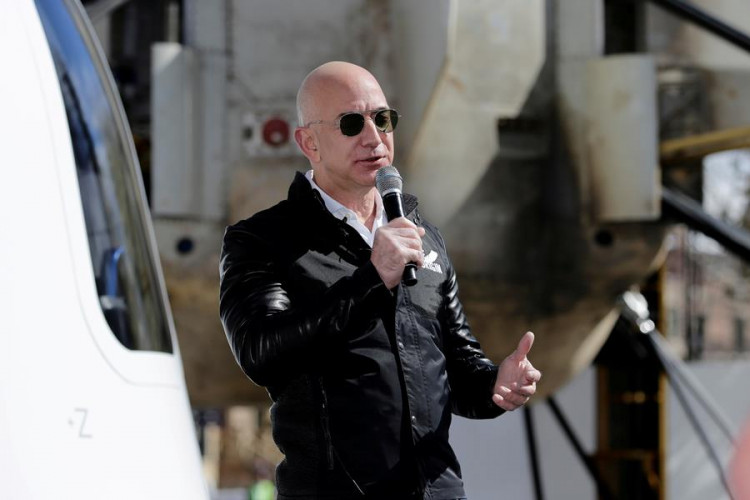The Washington Post has found itself at the center of a media firestorm following a controversial decision by its owner, Jeff Bezos, to halt the paper's tradition of endorsing presidential candidates, just days before the 2024 election. In a rare op-ed published Monday evening, Bezos defended the decision, which has sparked resignations, subscriber cancellations, and allegations of political maneuvering.
"Presidential endorsements do nothing to tip the scales of an election," Bezos wrote, adding that the decision to end the practice was a principled move aimed at preserving the paper's journalistic integrity. "No undecided voters in Pennsylvania are going to say, 'I'm going with Newspaper A's endorsement.' What presidential endorsements actually do is create a perception of bias."
The timing of the decision, made less than two weeks before the election between Vice President Kamala Harris and former President Donald Trump, has raised questions among staff and readers. According to NPR, more than 200,000 subscribers have canceled their digital subscriptions in response, representing nearly 8% of the paper's 2.5 million subscribers. The sudden announcement also triggered the resignation of multiple editorial board members, including Pulitzer Prize-winning columnist David Hoffman.
Hoffman, who had recently been awarded a Pulitzer for his series on authoritarian regimes, stated in his resignation letter that he could no longer remain silent while the paper "gave in to silence" by refusing to endorse Harris. "We face a terrible, looming autocracy," Hoffman told CNN, referencing the potential return of Trump to the White House. "I cannot sit here any longer while we have lost our voice."
The decision to block the endorsement of Harris reportedly came after an endorsement had already been drafted by the editorial board, but was quashed by Bezos. Former Washington Post Executive Editor Marty Baron was among the high-profile critics of the move, calling it "cowardly" and suggesting that Bezos was motivated by a desire to appease Trump, should he win the election. "This was clearly made for other reasons, not for reasons of high principle," Baron told NPR.
Adding to the controversy, a meeting between executives from Bezos' space company, Blue Origin, and Trump took place just hours after the decision was announced. Critics have suggested the timing indicates a connection between the two events, though Bezos denied these allegations in his op-ed, insisting that there was "no quid pro quo" and that he had no prior knowledge of the meeting.
"I sighed when I found out about the meeting because I knew it would provide ammunition to those who would like to frame this as anything other than a principled decision," Bezos wrote. He emphasized that the Post's decision was made "entirely internally," and there was no consultation with any candidate or campaign.
Despite Bezos' defense, the fallout continues to impact the paper. Will Lewis, publisher of the Washington Post, has tried to frame the decision as a return to the paper's independent roots, but few within the newsroom are convinced. The timing of the decision, combined with the high-stakes nature of the election, has left many questioning the motives behind the move.
Molly Roberts, another editorial board member who resigned in protest, posted a statement on social media warning of the potential consequences of remaining silent. "Donald Trump is not yet a dictator," she wrote. "But the quieter we are, the closer he comes."
Former Post columnist Robert Kagan echoed those concerns during an appearance on CNN, stating that the paper was "bending the knee" to Trump by refusing to endorse Harris. Kagan added that the decision left the Post vulnerable to accusations of political favoritism, particularly given Bezos' other business interests, which include Blue Origin's multi-billion-dollar contracts with NASA.
These concerns were not lost on Bezos, who acknowledged in his op-ed that his various business ventures, including Amazon and Blue Origin, create potential conflicts of interest for the Post. "When it comes to the appearance of conflict, I am not an ideal owner of The Post," he admitted, though he maintained that his wealth acts as "a bulwark against intimidation."
Despite the internal turmoil, Bezos has remained resolute in his position, stating that he would not allow the paper to "fade into irrelevance" by succumbing to bias or undue influence. However, the decision continues to stir controversy within the newsroom. Editorial Page Editor David Shipley reportedly held a tense meeting with opinion section staff on Monday, during which he admitted that he had tried to convince Bezos to reverse his decision but failed.
While Bezos defends his decision as a move toward impartiality, the resignation of respected journalists and the loss of subscribers highlight the significant challenges the Washington Post now faces. As one of the nation's leading news organizations, the paper's future direction under Bezos' leadership remains uncertain, with many inside and outside the newsroom questioning whether the decision to avoid an endorsement will ultimately help or harm the paper's reputation.
In the wake of the backlash, former Post executive editor Marcus Brauchli urged readers not to cancel their subscriptions, noting that doing so would only weaken an essential institution. "It shoots you in the foot if you care about the kind of in-depth, quality journalism like the Post produces," Brauchli said in a statement to NPR. "The range and depth of reporting by the Post's journalists is among the best in the world."





